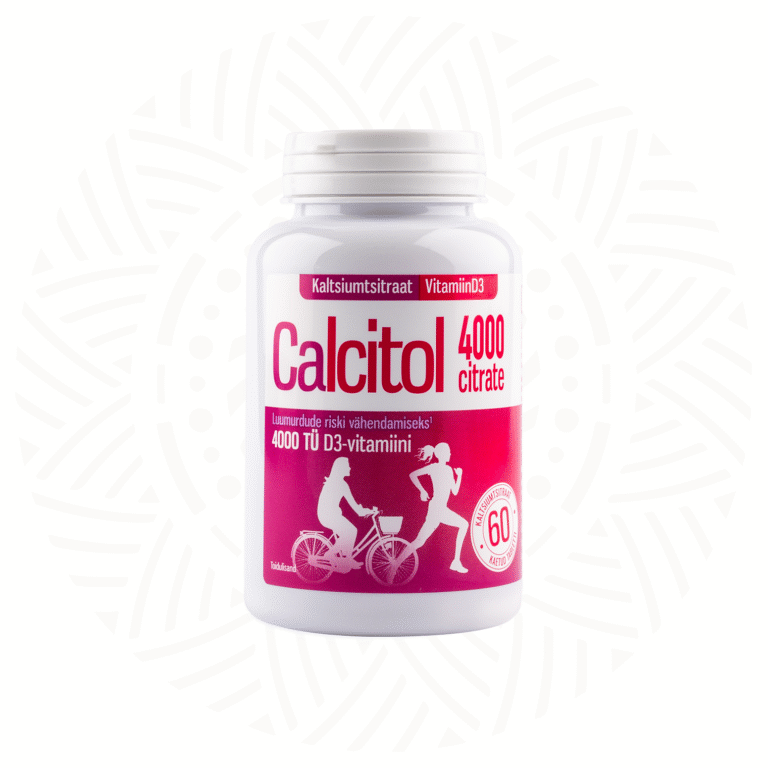Calcium is the most abundant mineral in the human body, crucial for the strength of bones and teeth, as well as for the good appearance of nails and hair. Additionally, calcium plays a role in the functioning of nerve and muscle cells, including the heart muscle.
Unfortunately, 90% of adults and 70% of children do not get enough calcium through their diet on a daily basis. When the amount of calcium in food falls below the recommended norm, a deficiency develops, leading to serious health problems. Below, we will clarify how to take calcium to compensate for the daily deficiency.
What is the daily calcium requirement?
The daily calcium requirement for strong bones and teeth varies by age. The increased calcium need is primarily seen in growing children and adolescents, pregnant and breastfeeding women, and postmenopausal women. When the body experiences a calcium deficiency, it starts to take calcium from the bones and teeth to compensate for the deficit.
The daily calcium needs are:
- Children up to 10 years old: 600 – 900 mg
- Children and adolescents over 10 years old: 1000 – 1200 mg
- Women before menopause: 1000 mg
- Women after menopause: 1200 – 1500 mg
- Pregnant and breastfeeding women: 1300 – 1500 mg
- Men: 1200 – 1500 mg
For example, to get 1000 mg of calcium, you would need to eat 108 g of cheese, 357 g of almonds, or drink 6 glasses of milk per day.
Why should postmenopausal women take extra calcium?
Estrogen is a female hormone that protects the skeleton and helps it regenerate. After menopause, estrogen levels gradually decline, and bone tissue breakdown becomes more dominant. This is the main reason why older women suffer from osteoporosis. If you have reached menopause, your daily calcium needs significantly increase.
Another important reason is that after menopause, stomach acid production drops by up to three times, which means calcium is no longer absorbed as well as it was in younger years. Since menopause is a critical time for a woman’s bones, choose well-absorbing calcium to maintain strong bones – calcium citrate. The absorption of calcium in citrate form does not depend on stomach acid.
Who else should consider taking calcium supplements?
Even if you eat a healthy and balanced diet, you may have an increased need for calcium in certain cases. You should consider taking additional calcium tablets if:
- you drink more than 3 cups of coffee a day
- you consume sweetened soft drinks
- you love salty foods
- you are vegan
- you smoke
- you consume alcohol
- you have lactose intolerance
- you are undergoing long-term corticosteroid treatment
- you have an inflammatory bowel disease
- you have had bariatric surgery.
What improves calcium absorption?
Calcium is a mineral that the body does not produce on its own. Also, calcium from food cannot absorb properly by itself. Therefore, it is important that your daily diet is balanced and contains sufficient vitamins and minerals.
Factors that promote calcium absorption:
- Vitamin D
- Vitamin A
- Vitamin C
- Magnesium
- Phosphorus
- Iron
- Amino acids
- Unsaturated fatty acids
Always take calcium with Vitamin D
In order for the body to absorb calcium well, adequate Vitamin D levels are required. If the Vitamin D level is below the recommended norm, only 10% of calcium is absorbed. It is worth knowing that Vitamin D deficiency is widespread among people living in Estonia, even during the summer months.
Calcium absorption is optimal when the Vitamin D level in the blood is at least 85 nmol/l. To achieve this Vitamin D level, a person of normal weight must take at least 2500 IU year-round, and an overweight person must take 4000 IU.
What if blood tests show elevated calcium levels?
Calcium is necessary for the effective functioning of the heart muscle. If your body does not get enough calcium from food, it starts taking it from bones and teeth to maintain the normal function of the heart muscle. If a blood test shows elevated calcium levels, it means increased release of calcium from the bones. This, in turn, indicates faster bone thinning and tooth decay.
If your blood test shows that calcium levels are high, it could be a sign of low Vitamin D levels. Be aware that for optimal calcium absorption, Vitamin D levels in the blood should be at least 85 nmol/l.
Do not take calcium and magnesium together
Although magnesium is necessary for better calcium absorption, do not take them together at the same time. The interval between taking calcium and magnesium should be at least 2-3 hours. Why?
Calcium and magnesium are minerals that are absorbed through the same channel-receptor in the body. Since magnesium is more active, calcium cannot be absorbed simultaneously. Therefore, avoid preparations where calcium and magnesium are combined in one tablet. The same rule applies to calcium magnesium zinc complexes.
When is the best time to take calcium?
For better absorption of calcium, it should be taken in the evening, as the body primarily uses calcium at night. Since calcium carbonate absorption depends on stomach acid, it should be taken before dinner. Calcium citrate absorption is not affected by stomach acid, so it can be taken after dinner.
How long should calcium tablets be taken?
If your lifestyle does not cover the daily calcium requirement, you should regularly take calcium tablets.
Even at an older age, calcium absorption is disrupted, and that is why the Health Development Institute recommends that women over 50 take 500mg of calcium daily, regardless of diet.
What happens if you take too much calcium?
Calcium absorption depends on the amount of calcium consumed. For larger single doses, calcium bioavailability decreases. The optimal single dose is 500 mg. If you need more than 500 mg of calcium, leave at least 4 hours between doses.
Which calcium should you choose?
There are mainly two types of calcium available on pharmacy shelves – calcium carbonate and calcium citrate. Calcium carbonate is inexpensive and therefore often the first choice; it contains the most elemental calcium per gram (42%). However, calcium carbonate is not well soluble in water and thus requires a good level of stomach acid to break it down.
Therefore, calcium carbonate has very low bioavailability, especially in older age when stomach acid levels are uneven. Additionally, calcium carbonate absorption decreases with age (women over 50) and with interactions with various medications, mainly acid reflux drugs (e.g., Omeprazole). Undigested calcium carbonate in the digestive tract causes unpleasant health problems – constipation, bloating, and flatulence.
When choosing the right calcium, don’t just look at the price, but also check the composition on the back of the product.
Well-absorbed calcium is:
- calcium citrate
- with Vitamin D
- without magnesium
Why choose calcium citrate?
Calcium citrate is the preferred choice for:
- low stomach acid levels
- uneven stomach acid levels (over 50 years old)
- users of antacids, PPIs, and H2 blockers
- absorption disorders, such as inflammatory bowel disease.
Always prefer calcium citrate if you value guaranteed quality. Calcium citrate absorbs up to 16 times better compared to calcium carbonate. Calcium citrate dissolves quickly and easily in water or other neutral pH environments. Therefore, calcium citrate is suitable for use at any age.
Take calcium wisely and stay healthy!






